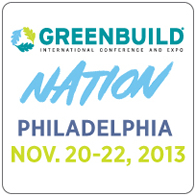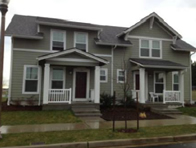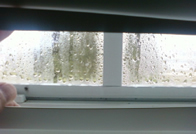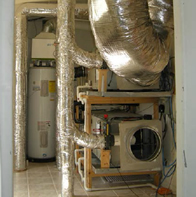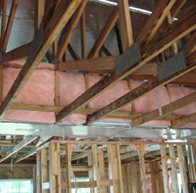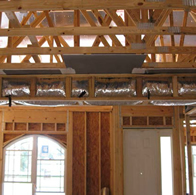|
Course Spotlight: RESNET Combustion Safety Class
This is a three-day course (two days of instruction, testing on the third day, which includes practical simulation). The class will cover the RESNET protocols, how to perform the testing, hands-on practice, a walk-through of the simulation tool, and a field trip to a house with combustion appliances.
Register |
FSEC Staff Nominated to the IREC Board of Directors
FSEC’s Eric Martin, program director for the Building America Partnership for Improved Residential Construction (BA-PIRC), was appointed to the Interstate Renewable Energy Council (IREC) Board of Directors for a two-year term. IREC is a non-profit organization accelerating the use of renewable energy and energy efficiency since 1982. IREC works to expand consumer access to clean energy; generates information and objective analysis grounded in best practices and standards; and leads programs to build a quality, clean energy workforce.
About IREC |
FSEC Exibits at GreenBuild 2013 on November 20-22nd
Make sure to stop by FSEC's booth #1726 at GreenBuild's exhibit hall this year held in Philadelphia, PA. As an exhibitor, FSEC will showcase the latest EnergyGauge software.
Register for GreenBuild |
Manatee County Habitat Wins Award
FSEC partner Manatee County Habitat for Humanity (HFH) recently completed a home certified under the DOE Challenge Home program. The affiliate received a Challenge Home Builder Award at the DOE Housing Innovation Awards, held in conjunction with the Solar Decathlon in Irvine, CA. |
FSEC Researchers Seek Partners in Remodeling Industry
FSEC researchers have distilled a set of practical, off-the-shelf best practices for renovations in typical Florida homes that cost-effectively produce about 30% improvement in whole house efficiency (HERS Index) when fully implemented. The best practices are based on a four-year study involving 10 affordable housing entities that completed 70 comprehensive renovations, in addition to a 2012 pilot program. FSEC researchers invite the remodeling, renovation, and affordable housing sectors to take the Retrofit Challenge by adopting a set of best practices as master specifications in 2014. Master specifications create a standard treatment across multiple projects and reduce time needed to write scopes of work. Measures include moderately higher performance specifications at equipment replacement (HVAC, appliances, water heating, etc), efficiency enhancements (e.g. ceiling insulation), and building science measures that address combustion safety, durability, and moisture management.
Contact Janet McIlvaine | Review the Standards |
|
Evaluation of Savings in Energy-Efficient Public Housing in the Pacific Northwest
Washington State University, a BA-PIRC research partner, presents the results of an energy performance and cost-effectiveness analysis. The Salishan phase 7 and demonstration homes, each with differing sets of high performance features, were compared to earlier homes built to 2006 Washington State energy code specifications.
Publication |
Flexible Residential Test Facility: Impact of Infiltration and Ventilation on Measured Heating Season Energy and Moisture Levels
Experiments were conducted in two identical laboratory homes to evaluate how infiltration and ventilation affect space conditioning energy use and comfort. The lab homes are designed to represent existing Florida housing stock.
Publication |
Energy and Economic Optimization to Achieve Near Zero Energy Homes in Europe: Implications of Inclusion of Lighting and Appliances
This paper analyzes the optimum mix of conservation measures and solar PV to reach net zero energy in existing houses in 31 different climates across Europe. The results show sensitivity to the inclusion of lighting and appliances in the mix of the efficiency measures to achieve effective electricity reduction for Zero Energy Homes in Europe.
Publication
|
Impacts of “Right Sizing” of Fixed Capacity and Variable Capacity Heat Pumps with Attic and Indoor Ductwork
This research examines the performance of 2-ton and 3-ton fixed- and variable-capacity systems and the impacts of system oversizing.
Case Study |
Raised Ceiling Interior Duct System
One of BA-PIRC’s longtime Habitat for Humanity partners, S.E. Volusia CO (SEVHFH), recently completed a home to the new Challenge Home standards. Unwilling to incur the added costs of a foam roof deck or wall heights above 8 feet to accommodate a fur-down chase, SEVHFH opted to build a fur-up or raised ceiling chase.
Case Study |
Ducts Inside Conditioned Space - Fur Down Approach
This case study examines one Building America’s Builder Partner’s implementation of an inexpensive, quick and effective method of building a fur-down or dropped ceiling chase.
Case Study |
|
2014 Continuing Education Dates Now Online!
FSEC offers a wide range of courses covering renewable energy and building energy technology topics. Most include both classroom instruction and hands-on field experience. Some courses offer CEU credits and are approved for Florida professional license renewals.
FSEC Courses |
| New 2014 Weatherization Courses |
Weatherization Energy Auditor Single Family
This two-week lecture-lab provides the student with an in-depth understanding of the auditing process and treating the house as a system. This course is based on the WAPTAC Standardized curricula and the NREL / U.S. DOE Job Task Analysis.
Register |
Weatherization Quality Control Inspector
In this 5-day lecture-lab course, students will be introduced to and practice the skills needed to become an effective QCI. This course is based on the WAPTAC Standardized curricula and the NREL / U.S. DOE Job Task Analysis.
Register |


